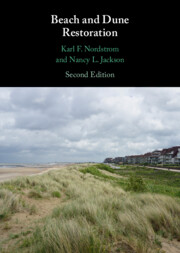Book contents
- Beach and Dune Restoration
- Reviews
- Beach and Dune Restoration
- Copyright page
- Contents
- Contributors
- Preface
- Acknowledgments
- 1 The Need for Restoration
- 2 Beach Nourishment and Impacts
- 3 Dune Building Practices and Impacts
- 4 Restoring Processes, Structure, and Functions
- 5 Altering or Removing Shore Protection Structures
- 6 Options in Spatially Restricted Environments
- 7 Stakeholder Interests, Conflicts, and Cooperation
- 8 A Locally Based Program for Beach and Dune Restoration
- 9 Research Needs
- References
- Index
1 - The Need for Restoration
Published online by Cambridge University Press: 09 December 2021
- Beach and Dune Restoration
- Reviews
- Beach and Dune Restoration
- Copyright page
- Contents
- Contributors
- Preface
- Acknowledgments
- 1 The Need for Restoration
- 2 Beach Nourishment and Impacts
- 3 Dune Building Practices and Impacts
- 4 Restoring Processes, Structure, and Functions
- 5 Altering or Removing Shore Protection Structures
- 6 Options in Spatially Restricted Environments
- 7 Stakeholder Interests, Conflicts, and Cooperation
- 8 A Locally Based Program for Beach and Dune Restoration
- 9 Research Needs
- References
- Index
Summary
Chapter 1 identifies how shorelines are converted to artifacts by eliminating dunes to facilitate coastal construction and provide beach access and by grading and cleaning beaches to make them more attractive to beach users. Beach erosion and attempts to retain buildings and infrastructure near the shoreline can result in truncation or loss of beach, dune, and active bluff environments. Restoring lost landforms and habitat can compensate for past losses, protect endangered species, retain seed sources, enhance nature tourism, make the coast more resilient to future perturbations and reestablish appreciation for naturally functioning landscapes. The values of beaches and dunes are identified and different restoration approaches are presented. The underpinning principles for restoration and policy guidelines are presented; and restoration approaches are categorized. The case is made that restoration to a previously undisturbed state is not feasible on developed coasts, and the challenge is to maximize natural features to the extent allowed by natural processes and competing human demands. Alternatives to achieve these outcomes are addressed in the subsequent chapters.
Keywords
- Type
- Chapter
- Information
- Beach and Dune Restoration , pp. 1 - 25Publisher: Cambridge University PressPrint publication year: 2021

